MAR0131: Intercultural Competence in Business - A Detailed Case Study
VerifiedAdded on 2023/06/08
|9
|2202
|310
Case Study
AI Summary
This case study analyzes a scenario where a young immigrant, Ben, encounters intercultural challenges while managing a business in a new cultural environment. It identifies Ben's missteps in understanding and adapting to the local culture, particularly in comparison to Middle Eastern business practices. The study suggests strategies for improving intercultural communication, including understanding cultural nuances, building relationships, and adopting appropriate communication styles. It references intercultural communication theories to explain the dynamics at play and provides recommendations for Ben to foster better relationships with his employees and improve overall business outcomes. The conclusion emphasizes the importance of cultural awareness in preventing misunderstandings and promoting successful international business collaborations.
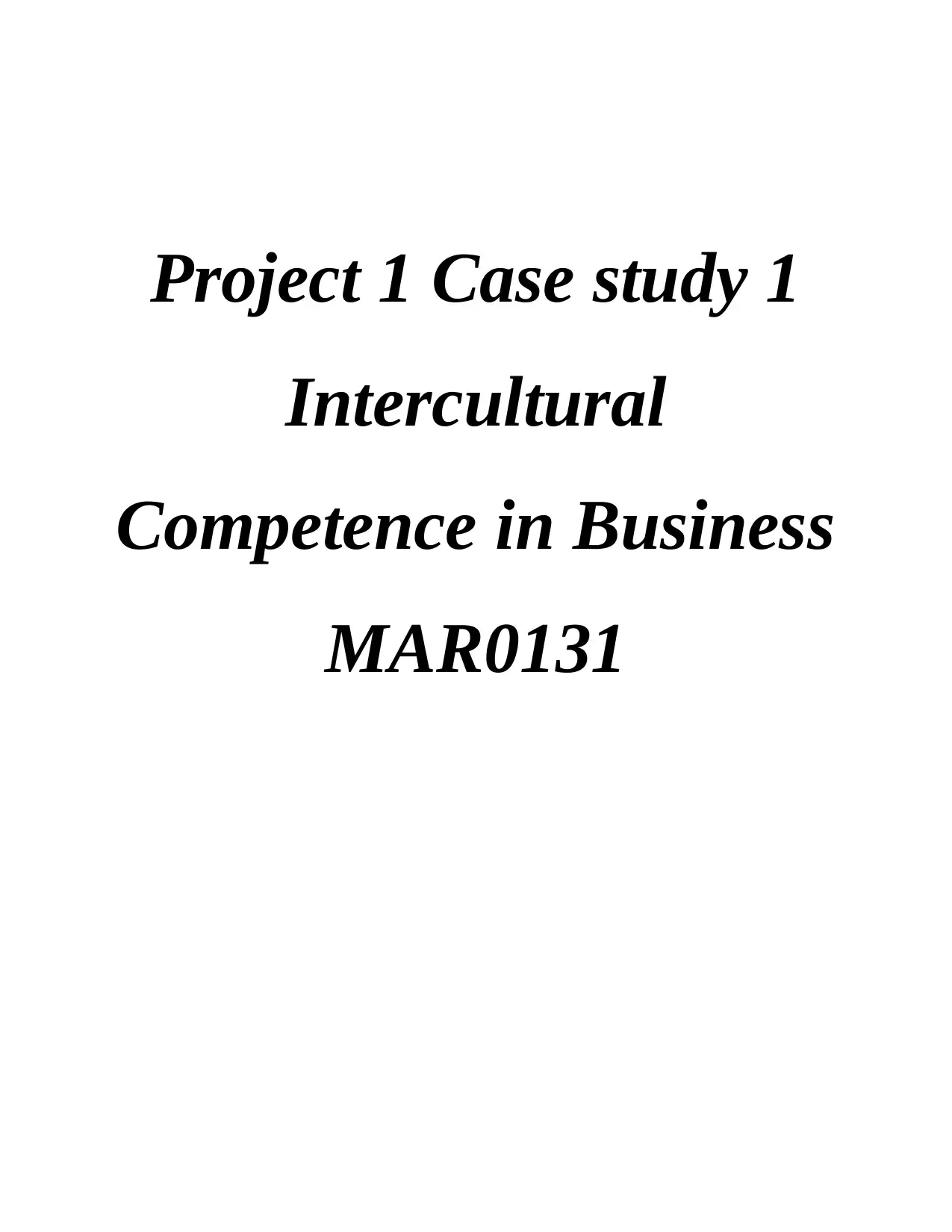
Project 1 Case study 1
Intercultural
Competence in Business
MAR0131
Intercultural
Competence in Business
MAR0131
Paraphrase This Document
Need a fresh take? Get an instant paraphrase of this document with our AI Paraphraser
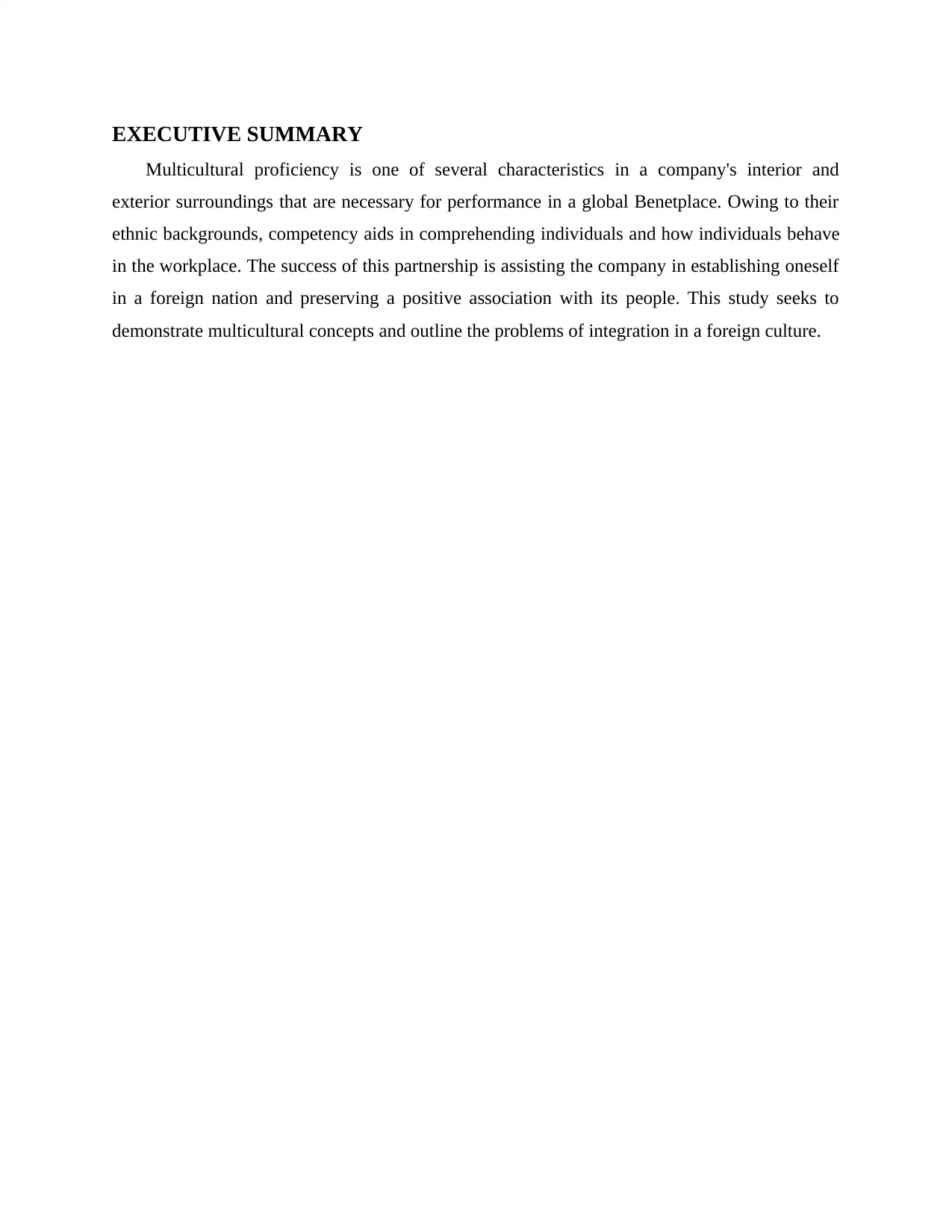
EXECUTIVE SUMMARY
Multicultural proficiency is one of several characteristics in a company's interior and
exterior surroundings that are necessary for performance in a global Benetplace. Owing to their
ethnic backgrounds, competency aids in comprehending individuals and how individuals behave
in the workplace. The success of this partnership is assisting the company in establishing oneself
in a foreign nation and preserving a positive association with its people. This study seeks to
demonstrate multicultural concepts and outline the problems of integration in a foreign culture.
Multicultural proficiency is one of several characteristics in a company's interior and
exterior surroundings that are necessary for performance in a global Benetplace. Owing to their
ethnic backgrounds, competency aids in comprehending individuals and how individuals behave
in the workplace. The success of this partnership is assisting the company in establishing oneself
in a foreign nation and preserving a positive association with its people. This study seeks to
demonstrate multicultural concepts and outline the problems of integration in a foreign culture.
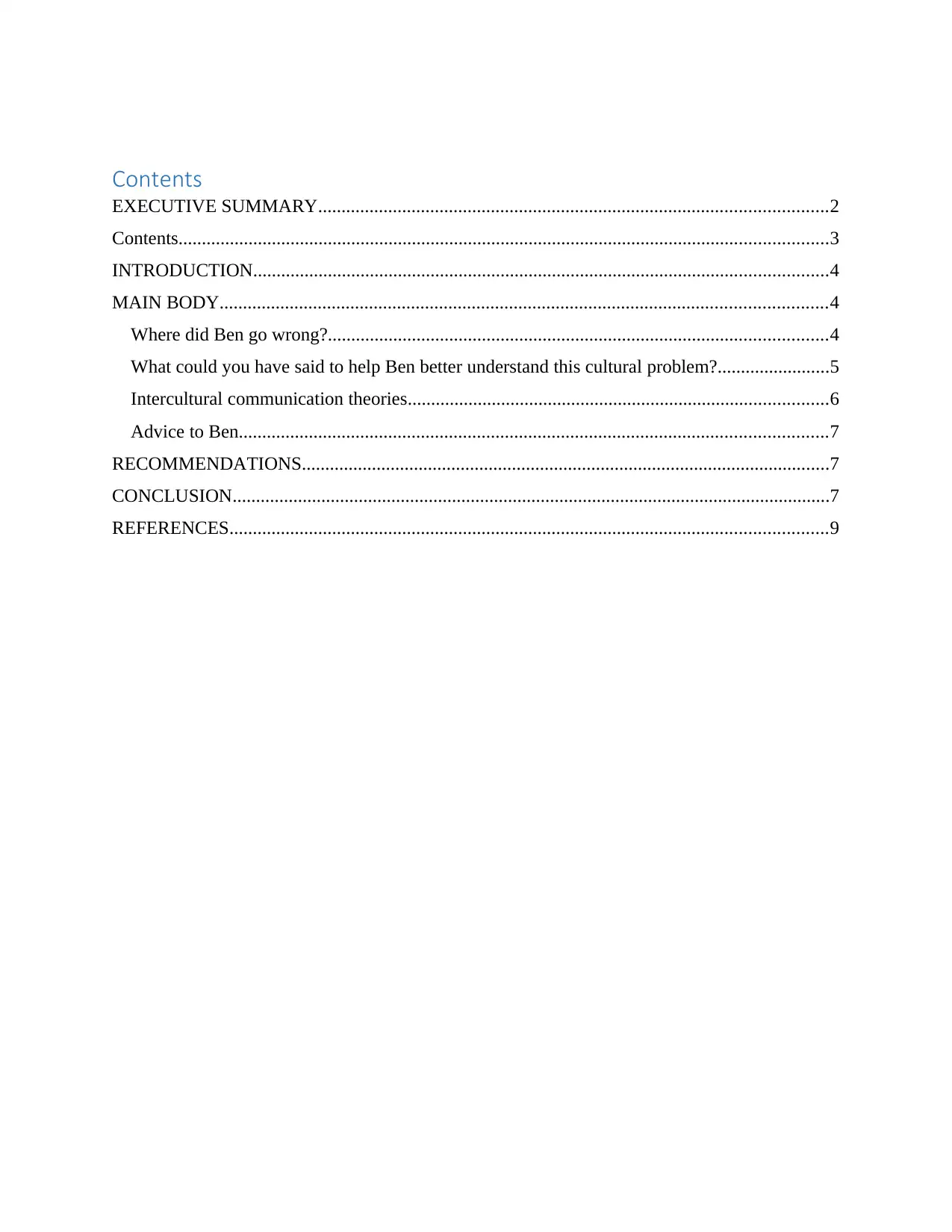
Contents
EXECUTIVE SUMMARY.............................................................................................................2
Contents...........................................................................................................................................3
INTRODUCTION...........................................................................................................................4
MAIN BODY..................................................................................................................................4
Where did Ben go wrong?...........................................................................................................4
What could you have said to help Ben better understand this cultural problem?........................5
Intercultural communication theories..........................................................................................6
Advice to Ben..............................................................................................................................7
RECOMMENDATIONS.................................................................................................................7
CONCLUSION................................................................................................................................7
REFERENCES................................................................................................................................9
EXECUTIVE SUMMARY.............................................................................................................2
Contents...........................................................................................................................................3
INTRODUCTION...........................................................................................................................4
MAIN BODY..................................................................................................................................4
Where did Ben go wrong?...........................................................................................................4
What could you have said to help Ben better understand this cultural problem?........................5
Intercultural communication theories..........................................................................................6
Advice to Ben..............................................................................................................................7
RECOMMENDATIONS.................................................................................................................7
CONCLUSION................................................................................................................................7
REFERENCES................................................................................................................................9
⊘ This is a preview!⊘
Do you want full access?
Subscribe today to unlock all pages.

Trusted by 1+ million students worldwide
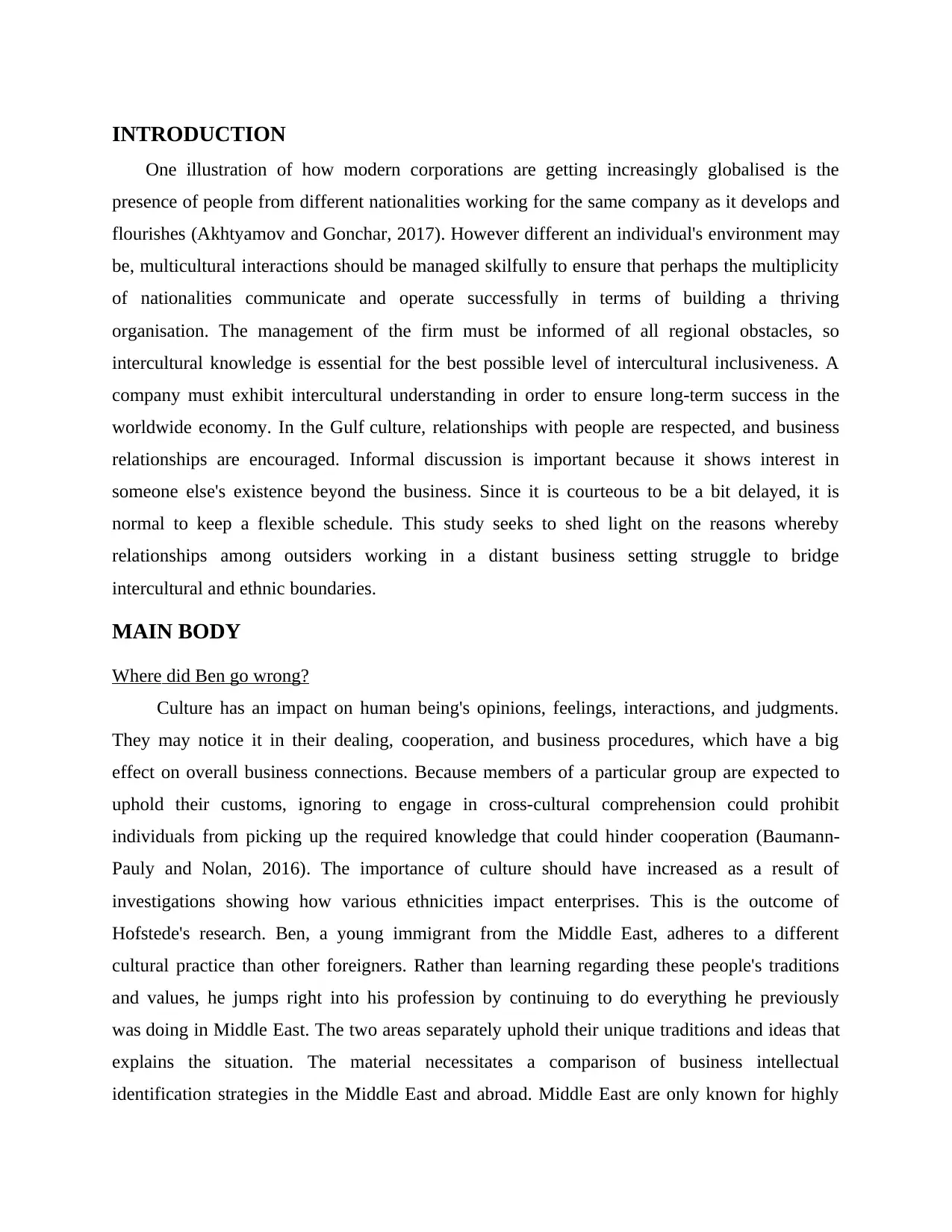
INTRODUCTION
One illustration of how modern corporations are getting increasingly globalised is the
presence of people from different nationalities working for the same company as it develops and
flourishes (Akhtyamov and Gonchar, 2017). However different an individual's environment may
be, multicultural interactions should be managed skilfully to ensure that perhaps the multiplicity
of nationalities communicate and operate successfully in terms of building a thriving
organisation. The management of the firm must be informed of all regional obstacles, so
intercultural knowledge is essential for the best possible level of intercultural inclusiveness. A
company must exhibit intercultural understanding in order to ensure long-term success in the
worldwide economy. In the Gulf culture, relationships with people are respected, and business
relationships are encouraged. Informal discussion is important because it shows interest in
someone else's existence beyond the business. Since it is courteous to be a bit delayed, it is
normal to keep a flexible schedule. This study seeks to shed light on the reasons whereby
relationships among outsiders working in a distant business setting struggle to bridge
intercultural and ethnic boundaries.
MAIN BODY
Where did Ben go wrong?
Culture has an impact on human being's opinions, feelings, interactions, and judgments.
They may notice it in their dealing, cooperation, and business procedures, which have a big
effect on overall business connections. Because members of a particular group are expected to
uphold their customs, ignoring to engage in cross-cultural comprehension could prohibit
individuals from picking up the required knowledge that could hinder cooperation (Baumann-
Pauly and Nolan, 2016). The importance of culture should have increased as a result of
investigations showing how various ethnicities impact enterprises. This is the outcome of
Hofstede's research. Ben, a young immigrant from the Middle East, adheres to a different
cultural practice than other foreigners. Rather than learning regarding these people's traditions
and values, he jumps right into his profession by continuing to do everything he previously
was doing in Middle East. The two areas separately uphold their unique traditions and ideas that
explains the situation. The material necessitates a comparison of business intellectual
identification strategies in the Middle East and abroad. Middle East are only known for highly
One illustration of how modern corporations are getting increasingly globalised is the
presence of people from different nationalities working for the same company as it develops and
flourishes (Akhtyamov and Gonchar, 2017). However different an individual's environment may
be, multicultural interactions should be managed skilfully to ensure that perhaps the multiplicity
of nationalities communicate and operate successfully in terms of building a thriving
organisation. The management of the firm must be informed of all regional obstacles, so
intercultural knowledge is essential for the best possible level of intercultural inclusiveness. A
company must exhibit intercultural understanding in order to ensure long-term success in the
worldwide economy. In the Gulf culture, relationships with people are respected, and business
relationships are encouraged. Informal discussion is important because it shows interest in
someone else's existence beyond the business. Since it is courteous to be a bit delayed, it is
normal to keep a flexible schedule. This study seeks to shed light on the reasons whereby
relationships among outsiders working in a distant business setting struggle to bridge
intercultural and ethnic boundaries.
MAIN BODY
Where did Ben go wrong?
Culture has an impact on human being's opinions, feelings, interactions, and judgments.
They may notice it in their dealing, cooperation, and business procedures, which have a big
effect on overall business connections. Because members of a particular group are expected to
uphold their customs, ignoring to engage in cross-cultural comprehension could prohibit
individuals from picking up the required knowledge that could hinder cooperation (Baumann-
Pauly and Nolan, 2016). The importance of culture should have increased as a result of
investigations showing how various ethnicities impact enterprises. This is the outcome of
Hofstede's research. Ben, a young immigrant from the Middle East, adheres to a different
cultural practice than other foreigners. Rather than learning regarding these people's traditions
and values, he jumps right into his profession by continuing to do everything he previously
was doing in Middle East. The two areas separately uphold their unique traditions and ideas that
explains the situation. The material necessitates a comparison of business intellectual
identification strategies in the Middle East and abroad. Middle East are only known for highly
Paraphrase This Document
Need a fresh take? Get an instant paraphrase of this document with our AI Paraphraser
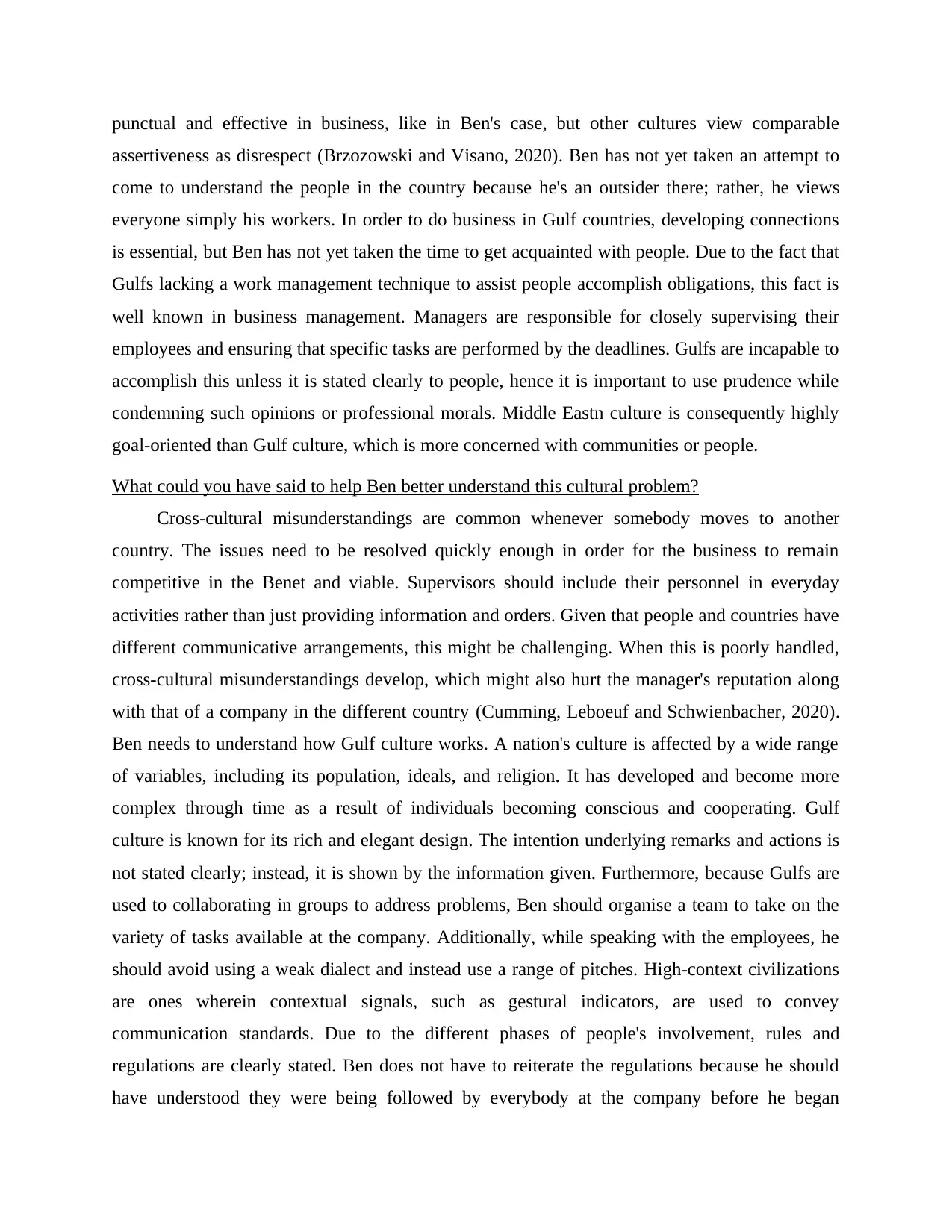
punctual and effective in business, like in Ben's case, but other cultures view comparable
assertiveness as disrespect (Brzozowski and Visano, 2020). Ben has not yet taken an attempt to
come to understand the people in the country because he's an outsider there; rather, he views
everyone simply his workers. In order to do business in Gulf countries, developing connections
is essential, but Ben has not yet taken the time to get acquainted with people. Due to the fact that
Gulfs lacking a work management technique to assist people accomplish obligations, this fact is
well known in business management. Managers are responsible for closely supervising their
employees and ensuring that specific tasks are performed by the deadlines. Gulfs are incapable to
accomplish this unless it is stated clearly to people, hence it is important to use prudence while
condemning such opinions or professional morals. Middle Eastn culture is consequently highly
goal-oriented than Gulf culture, which is more concerned with communities or people.
What could you have said to help Ben better understand this cultural problem?
Cross-cultural misunderstandings are common whenever somebody moves to another
country. The issues need to be resolved quickly enough in order for the business to remain
competitive in the Benet and viable. Supervisors should include their personnel in everyday
activities rather than just providing information and orders. Given that people and countries have
different communicative arrangements, this might be challenging. When this is poorly handled,
cross-cultural misunderstandings develop, which might also hurt the manager's reputation along
with that of a company in the different country (Cumming, Leboeuf and Schwienbacher, 2020).
Ben needs to understand how Gulf culture works. A nation's culture is affected by a wide range
of variables, including its population, ideals, and religion. It has developed and become more
complex through time as a result of individuals becoming conscious and cooperating. Gulf
culture is known for its rich and elegant design. The intention underlying remarks and actions is
not stated clearly; instead, it is shown by the information given. Furthermore, because Gulfs are
used to collaborating in groups to address problems, Ben should organise a team to take on the
variety of tasks available at the company. Additionally, while speaking with the employees, he
should avoid using a weak dialect and instead use a range of pitches. High-context civilizations
are ones wherein contextual signals, such as gestural indicators, are used to convey
communication standards. Due to the different phases of people's involvement, rules and
regulations are clearly stated. Ben does not have to reiterate the regulations because he should
have understood they were being followed by everybody at the company before he began
assertiveness as disrespect (Brzozowski and Visano, 2020). Ben has not yet taken an attempt to
come to understand the people in the country because he's an outsider there; rather, he views
everyone simply his workers. In order to do business in Gulf countries, developing connections
is essential, but Ben has not yet taken the time to get acquainted with people. Due to the fact that
Gulfs lacking a work management technique to assist people accomplish obligations, this fact is
well known in business management. Managers are responsible for closely supervising their
employees and ensuring that specific tasks are performed by the deadlines. Gulfs are incapable to
accomplish this unless it is stated clearly to people, hence it is important to use prudence while
condemning such opinions or professional morals. Middle Eastn culture is consequently highly
goal-oriented than Gulf culture, which is more concerned with communities or people.
What could you have said to help Ben better understand this cultural problem?
Cross-cultural misunderstandings are common whenever somebody moves to another
country. The issues need to be resolved quickly enough in order for the business to remain
competitive in the Benet and viable. Supervisors should include their personnel in everyday
activities rather than just providing information and orders. Given that people and countries have
different communicative arrangements, this might be challenging. When this is poorly handled,
cross-cultural misunderstandings develop, which might also hurt the manager's reputation along
with that of a company in the different country (Cumming, Leboeuf and Schwienbacher, 2020).
Ben needs to understand how Gulf culture works. A nation's culture is affected by a wide range
of variables, including its population, ideals, and religion. It has developed and become more
complex through time as a result of individuals becoming conscious and cooperating. Gulf
culture is known for its rich and elegant design. The intention underlying remarks and actions is
not stated clearly; instead, it is shown by the information given. Furthermore, because Gulfs are
used to collaborating in groups to address problems, Ben should organise a team to take on the
variety of tasks available at the company. Additionally, while speaking with the employees, he
should avoid using a weak dialect and instead use a range of pitches. High-context civilizations
are ones wherein contextual signals, such as gestural indicators, are used to convey
communication standards. Due to the different phases of people's involvement, rules and
regulations are clearly stated. Ben does not have to reiterate the regulations because he should
have understood they were being followed by everybody at the company before he began
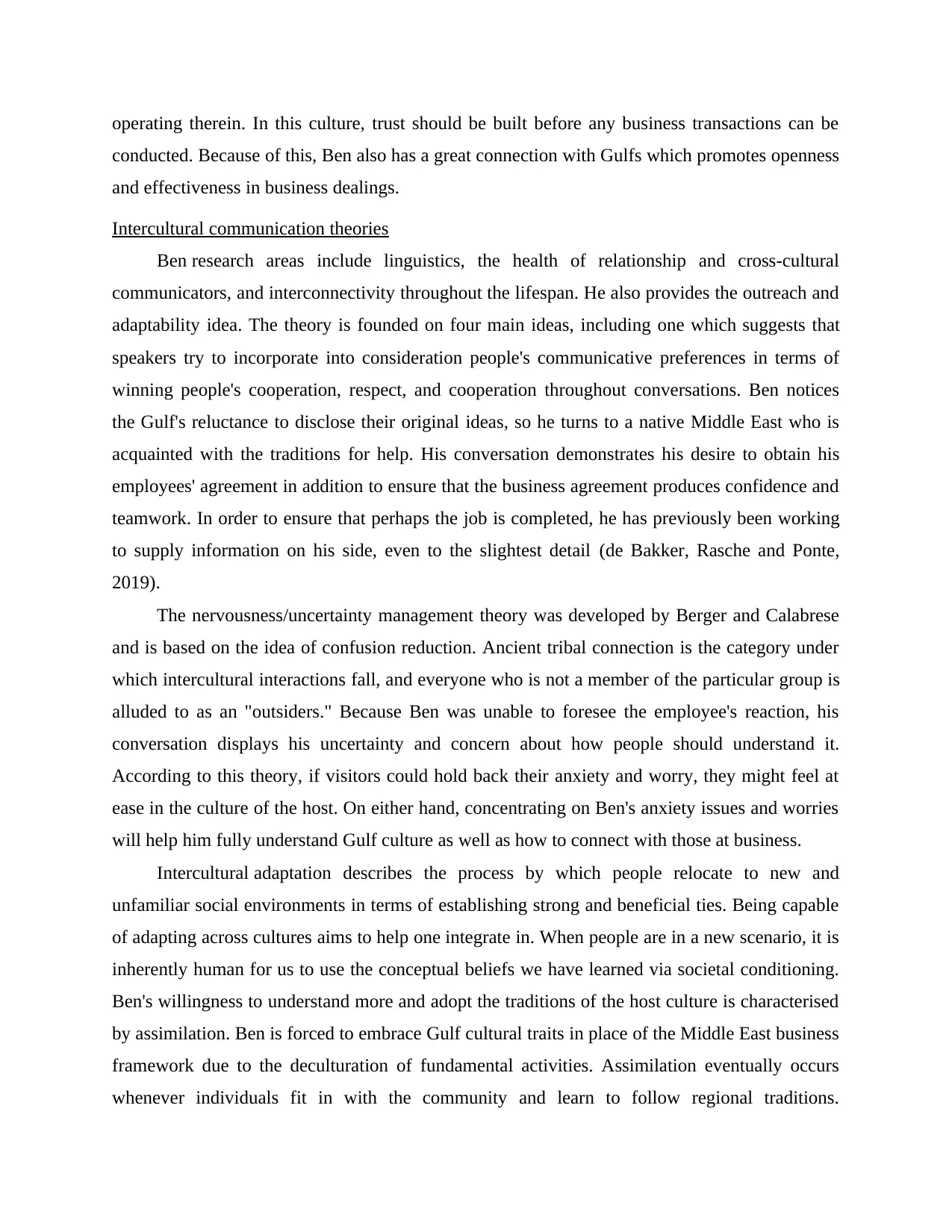
operating therein. In this culture, trust should be built before any business transactions can be
conducted. Because of this, Ben also has a great connection with Gulfs which promotes openness
and effectiveness in business dealings.
Intercultural communication theories
Ben research areas include linguistics, the health of relationship and cross-cultural
communicators, and interconnectivity throughout the lifespan. He also provides the outreach and
adaptability idea. The theory is founded on four main ideas, including one which suggests that
speakers try to incorporate into consideration people's communicative preferences in terms of
winning people's cooperation, respect, and cooperation throughout conversations. Ben notices
the Gulf's reluctance to disclose their original ideas, so he turns to a native Middle East who is
acquainted with the traditions for help. His conversation demonstrates his desire to obtain his
employees' agreement in addition to ensure that the business agreement produces confidence and
teamwork. In order to ensure that perhaps the job is completed, he has previously been working
to supply information on his side, even to the slightest detail (de Bakker, Rasche and Ponte,
2019).
The nervousness/uncertainty management theory was developed by Berger and Calabrese
and is based on the idea of confusion reduction. Ancient tribal connection is the category under
which intercultural interactions fall, and everyone who is not a member of the particular group is
alluded to as an "outsiders." Because Ben was unable to foresee the employee's reaction, his
conversation displays his uncertainty and concern about how people should understand it.
According to this theory, if visitors could hold back their anxiety and worry, they might feel at
ease in the culture of the host. On either hand, concentrating on Ben's anxiety issues and worries
will help him fully understand Gulf culture as well as how to connect with those at business.
Intercultural adaptation describes the process by which people relocate to new and
unfamiliar social environments in terms of establishing strong and beneficial ties. Being capable
of adapting across cultures aims to help one integrate in. When people are in a new scenario, it is
inherently human for us to use the conceptual beliefs we have learned via societal conditioning.
Ben's willingness to understand more and adopt the traditions of the host culture is characterised
by assimilation. Ben is forced to embrace Gulf cultural traits in place of the Middle East business
framework due to the deculturation of fundamental activities. Assimilation eventually occurs
whenever individuals fit in with the community and learn to follow regional traditions.
conducted. Because of this, Ben also has a great connection with Gulfs which promotes openness
and effectiveness in business dealings.
Intercultural communication theories
Ben research areas include linguistics, the health of relationship and cross-cultural
communicators, and interconnectivity throughout the lifespan. He also provides the outreach and
adaptability idea. The theory is founded on four main ideas, including one which suggests that
speakers try to incorporate into consideration people's communicative preferences in terms of
winning people's cooperation, respect, and cooperation throughout conversations. Ben notices
the Gulf's reluctance to disclose their original ideas, so he turns to a native Middle East who is
acquainted with the traditions for help. His conversation demonstrates his desire to obtain his
employees' agreement in addition to ensure that the business agreement produces confidence and
teamwork. In order to ensure that perhaps the job is completed, he has previously been working
to supply information on his side, even to the slightest detail (de Bakker, Rasche and Ponte,
2019).
The nervousness/uncertainty management theory was developed by Berger and Calabrese
and is based on the idea of confusion reduction. Ancient tribal connection is the category under
which intercultural interactions fall, and everyone who is not a member of the particular group is
alluded to as an "outsiders." Because Ben was unable to foresee the employee's reaction, his
conversation displays his uncertainty and concern about how people should understand it.
According to this theory, if visitors could hold back their anxiety and worry, they might feel at
ease in the culture of the host. On either hand, concentrating on Ben's anxiety issues and worries
will help him fully understand Gulf culture as well as how to connect with those at business.
Intercultural adaptation describes the process by which people relocate to new and
unfamiliar social environments in terms of establishing strong and beneficial ties. Being capable
of adapting across cultures aims to help one integrate in. When people are in a new scenario, it is
inherently human for us to use the conceptual beliefs we have learned via societal conditioning.
Ben's willingness to understand more and adopt the traditions of the host culture is characterised
by assimilation. Ben is forced to embrace Gulf cultural traits in place of the Middle East business
framework due to the deculturation of fundamental activities. Assimilation eventually occurs
whenever individuals fit in with the community and learn to follow regional traditions.
⊘ This is a preview!⊘
Do you want full access?
Subscribe today to unlock all pages.

Trusted by 1+ million students worldwide
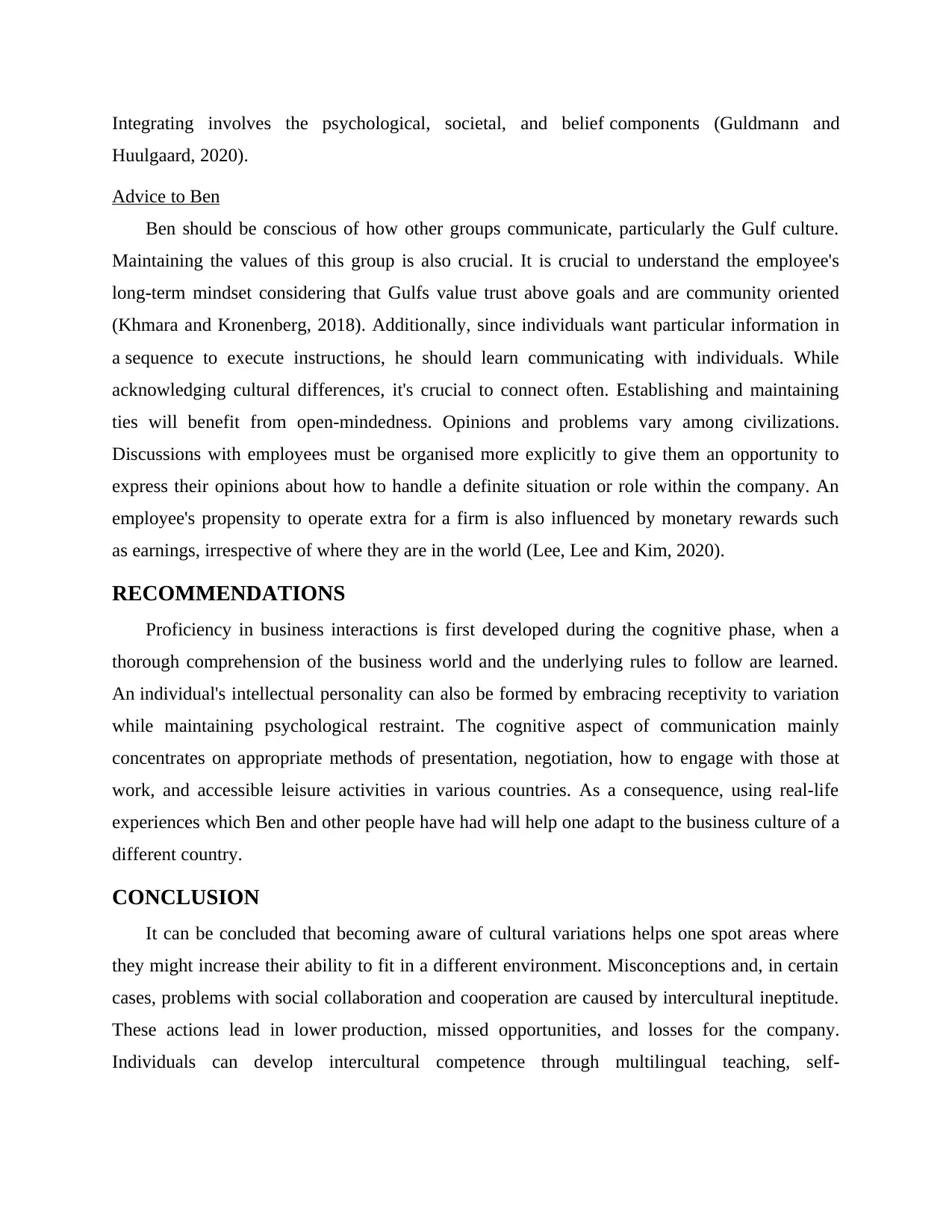
Integrating involves the psychological, societal, and belief components (Guldmann and
Huulgaard, 2020).
Advice to Ben
Ben should be conscious of how other groups communicate, particularly the Gulf culture.
Maintaining the values of this group is also crucial. It is crucial to understand the employee's
long-term mindset considering that Gulfs value trust above goals and are community oriented
(Khmara and Kronenberg, 2018). Additionally, since individuals want particular information in
a sequence to execute instructions, he should learn communicating with individuals. While
acknowledging cultural differences, it's crucial to connect often. Establishing and maintaining
ties will benefit from open-mindedness. Opinions and problems vary among civilizations.
Discussions with employees must be organised more explicitly to give them an opportunity to
express their opinions about how to handle a definite situation or role within the company. An
employee's propensity to operate extra for a firm is also influenced by monetary rewards such
as earnings, irrespective of where they are in the world (Lee, Lee and Kim, 2020).
RECOMMENDATIONS
Proficiency in business interactions is first developed during the cognitive phase, when a
thorough comprehension of the business world and the underlying rules to follow are learned.
An individual's intellectual personality can also be formed by embracing receptivity to variation
while maintaining psychological restraint. The cognitive aspect of communication mainly
concentrates on appropriate methods of presentation, negotiation, how to engage with those at
work, and accessible leisure activities in various countries. As a consequence, using real-life
experiences which Ben and other people have had will help one adapt to the business culture of a
different country.
CONCLUSION
It can be concluded that becoming aware of cultural variations helps one spot areas where
they might increase their ability to fit in a different environment. Misconceptions and, in certain
cases, problems with social collaboration and cooperation are caused by intercultural ineptitude.
These actions lead in lower production, missed opportunities, and losses for the company.
Individuals can develop intercultural competence through multilingual teaching, self-
Huulgaard, 2020).
Advice to Ben
Ben should be conscious of how other groups communicate, particularly the Gulf culture.
Maintaining the values of this group is also crucial. It is crucial to understand the employee's
long-term mindset considering that Gulfs value trust above goals and are community oriented
(Khmara and Kronenberg, 2018). Additionally, since individuals want particular information in
a sequence to execute instructions, he should learn communicating with individuals. While
acknowledging cultural differences, it's crucial to connect often. Establishing and maintaining
ties will benefit from open-mindedness. Opinions and problems vary among civilizations.
Discussions with employees must be organised more explicitly to give them an opportunity to
express their opinions about how to handle a definite situation or role within the company. An
employee's propensity to operate extra for a firm is also influenced by monetary rewards such
as earnings, irrespective of where they are in the world (Lee, Lee and Kim, 2020).
RECOMMENDATIONS
Proficiency in business interactions is first developed during the cognitive phase, when a
thorough comprehension of the business world and the underlying rules to follow are learned.
An individual's intellectual personality can also be formed by embracing receptivity to variation
while maintaining psychological restraint. The cognitive aspect of communication mainly
concentrates on appropriate methods of presentation, negotiation, how to engage with those at
work, and accessible leisure activities in various countries. As a consequence, using real-life
experiences which Ben and other people have had will help one adapt to the business culture of a
different country.
CONCLUSION
It can be concluded that becoming aware of cultural variations helps one spot areas where
they might increase their ability to fit in a different environment. Misconceptions and, in certain
cases, problems with social collaboration and cooperation are caused by intercultural ineptitude.
These actions lead in lower production, missed opportunities, and losses for the company.
Individuals can develop intercultural competence through multilingual teaching, self-
Paraphrase This Document
Need a fresh take? Get an instant paraphrase of this document with our AI Paraphraser

improvement, and intercultural knowledge. Understanding the publications of the local culture
might also create a close relationship with the members of the host culture.
might also create a close relationship with the members of the host culture.
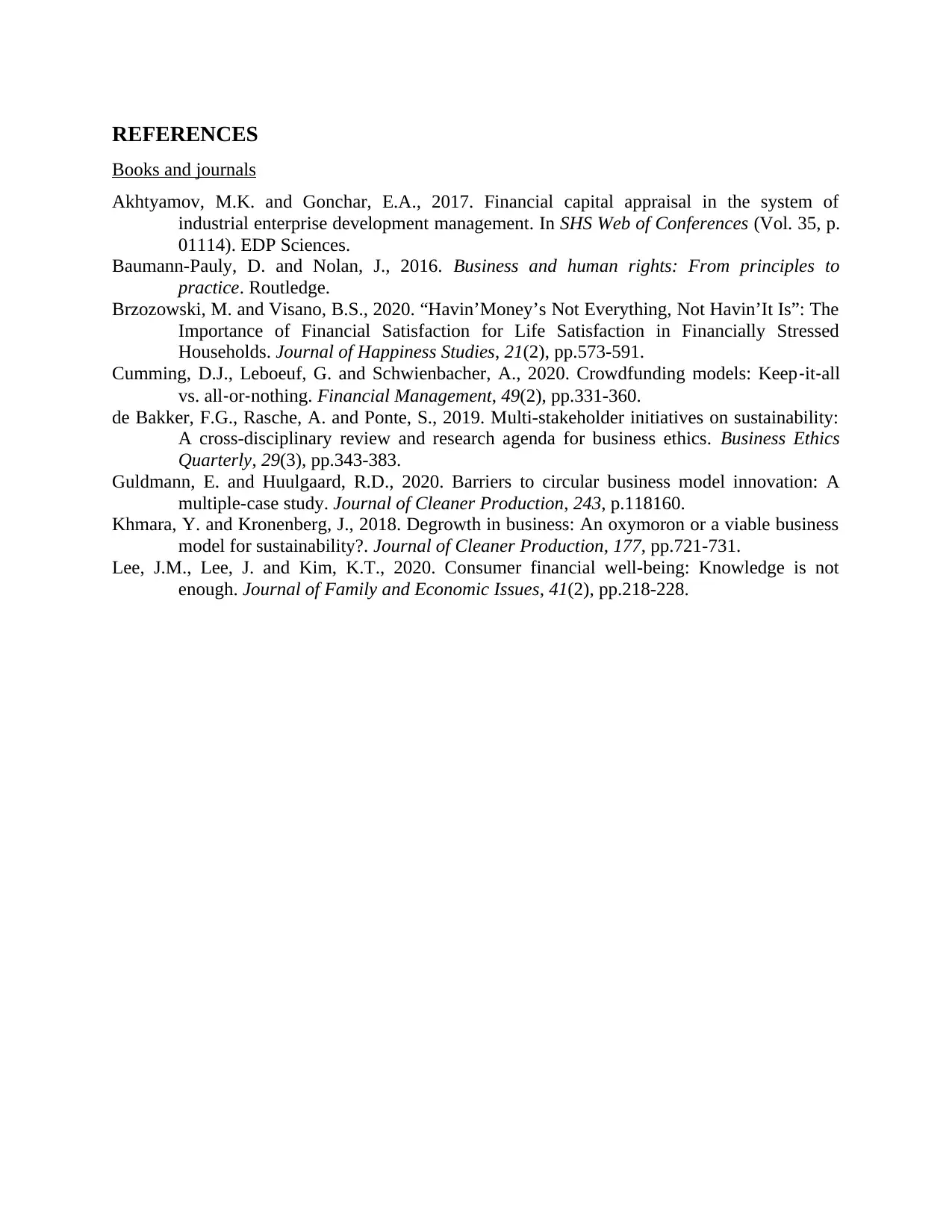
REFERENCES
Books and journals
Akhtyamov, M.K. and Gonchar, E.A., 2017. Financial capital appraisal in the system of
industrial enterprise development management. In SHS Web of Conferences (Vol. 35, p.
01114). EDP Sciences.
Baumann-Pauly, D. and Nolan, J., 2016. Business and human rights: From principles to
practice. Routledge.
Brzozowski, M. and Visano, B.S., 2020. “Havin’Money’s Not Everything, Not Havin’It Is”: The
Importance of Financial Satisfaction for Life Satisfaction in Financially Stressed
Households. Journal of Happiness Studies, 21(2), pp.573-591.
Cumming, D.J., Leboeuf, G. and Schwienbacher, A., 2020. Crowdfunding models: Keep‐it‐all
vs. all‐or‐nothing. Financial Management, 49(2), pp.331-360.
de Bakker, F.G., Rasche, A. and Ponte, S., 2019. Multi-stakeholder initiatives on sustainability:
A cross-disciplinary review and research agenda for business ethics. Business Ethics
Quarterly, 29(3), pp.343-383.
Guldmann, E. and Huulgaard, R.D., 2020. Barriers to circular business model innovation: A
multiple-case study. Journal of Cleaner Production, 243, p.118160.
Khmara, Y. and Kronenberg, J., 2018. Degrowth in business: An oxymoron or a viable business
model for sustainability?. Journal of Cleaner Production, 177, pp.721-731.
Lee, J.M., Lee, J. and Kim, K.T., 2020. Consumer financial well-being: Knowledge is not
enough. Journal of Family and Economic Issues, 41(2), pp.218-228.
Books and journals
Akhtyamov, M.K. and Gonchar, E.A., 2017. Financial capital appraisal in the system of
industrial enterprise development management. In SHS Web of Conferences (Vol. 35, p.
01114). EDP Sciences.
Baumann-Pauly, D. and Nolan, J., 2016. Business and human rights: From principles to
practice. Routledge.
Brzozowski, M. and Visano, B.S., 2020. “Havin’Money’s Not Everything, Not Havin’It Is”: The
Importance of Financial Satisfaction for Life Satisfaction in Financially Stressed
Households. Journal of Happiness Studies, 21(2), pp.573-591.
Cumming, D.J., Leboeuf, G. and Schwienbacher, A., 2020. Crowdfunding models: Keep‐it‐all
vs. all‐or‐nothing. Financial Management, 49(2), pp.331-360.
de Bakker, F.G., Rasche, A. and Ponte, S., 2019. Multi-stakeholder initiatives on sustainability:
A cross-disciplinary review and research agenda for business ethics. Business Ethics
Quarterly, 29(3), pp.343-383.
Guldmann, E. and Huulgaard, R.D., 2020. Barriers to circular business model innovation: A
multiple-case study. Journal of Cleaner Production, 243, p.118160.
Khmara, Y. and Kronenberg, J., 2018. Degrowth in business: An oxymoron or a viable business
model for sustainability?. Journal of Cleaner Production, 177, pp.721-731.
Lee, J.M., Lee, J. and Kim, K.T., 2020. Consumer financial well-being: Knowledge is not
enough. Journal of Family and Economic Issues, 41(2), pp.218-228.
⊘ This is a preview!⊘
Do you want full access?
Subscribe today to unlock all pages.

Trusted by 1+ million students worldwide
1 out of 9
Related Documents
Your All-in-One AI-Powered Toolkit for Academic Success.
+13062052269
info@desklib.com
Available 24*7 on WhatsApp / Email
![[object Object]](/_next/static/media/star-bottom.7253800d.svg)
Unlock your academic potential
Copyright © 2020–2025 A2Z Services. All Rights Reserved. Developed and managed by ZUCOL.





